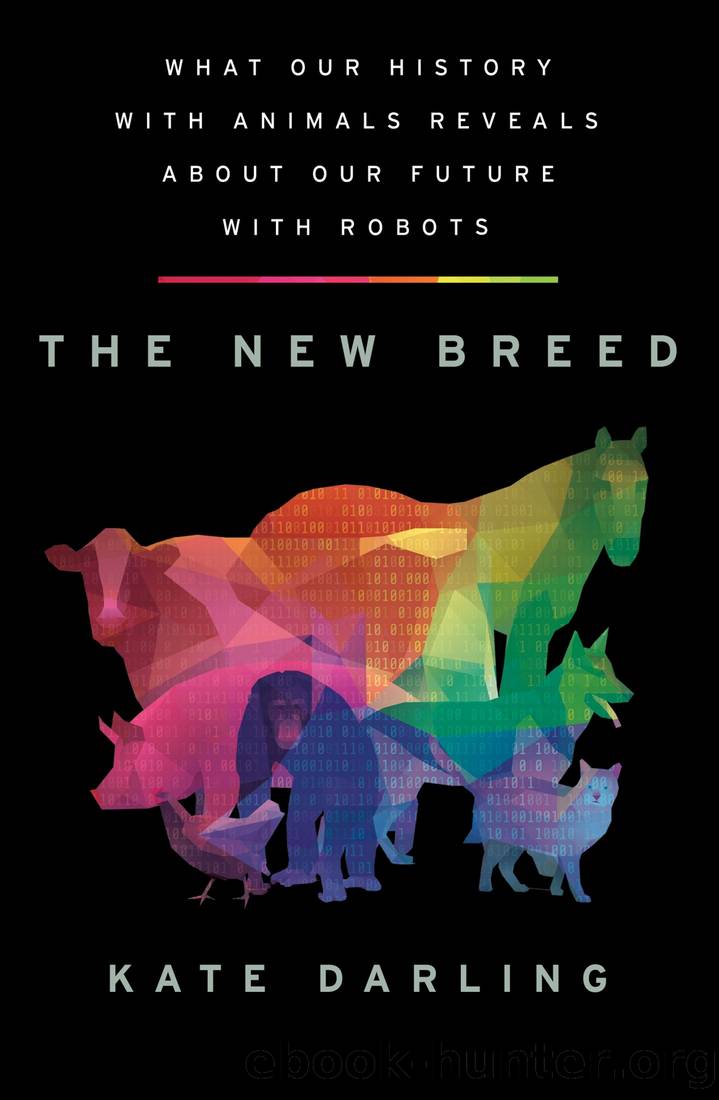The New Breed: What Our History With Animals Reveals About Our Future With Robots by Kate Darling

Author:Kate Darling [Darling, Kate]
Language: eng
Format: epub
ISBN: 9781250296108
Amazon: 1250296102
Publisher: Henry Holt and Co.
Published: 2021-04-19T23:00:00+00:00
BIAS IN ARTIFICIAL AGENT DESIGN
A few years ago, I stopped by IBM Research in Austin, Texas, to visit its supercomputer Watson. Named after IBMâs founder, the computer system was designed to answer open questions in natural language and had come to fame by beating champions Brad Rutter and Ken Jennings at Jeopardy! in 2011. An IBM research member brought me to a demo room. When we arrived, the room was dark, but as we walked in, an artificial voice politely greeted us and turned on the lights. The walls were lined with interactive screens and Watson-powered activities (like a recipe generator), and the main wall was an interface that let people converse with Watson, displaying beautiful data visualizations on a screen. I asked questions, and the supercomputer answered me in a deep, booming voice. When I met with some of the team after the session, I asked them: âWatson has such a deep voice. Why did you make the voice that greets the visitors and turns on the lights sound stereotypically female?â The answer they gave me was that nobody had really thought much about it. A man asked me, jokingly, âAre you a feminist?â
In The Man Who Lied to His Laptop, Clifford Nass and Corina Yen describe how, in the late 1990s, carmaker BMW had to recall the cutting-edge voice navigation system in their 5 Series car. Despite the fact that the software was superior to most other navigation systems on the market, German drivers flooded the service desk with complaints. Their issue? Men called in saying they didnât want to take driving directions from a female-sounding voice. In 2017, I talked to some Amazon executives about their voice assistant, Alexa. Amazon had done extensive research before launching their product. Unlike the BMW navigation system, Alexa takes commands rather than giving them. For this, an overwhelming percentage of users preferred the female-coded voice.
The academic research on stereotypes and in-group biases around artificial agents confirms the corporate research that informed Amazonâs design choice. Early on in human-computer interaction, Nass and his colleagues showed that people would rate a female-coded computer voice in a dominant role more negatively than a male-coded computer voice. People also rated the male-coded voice as more knowledgeable, even though the computers gave identical information. In subsequent research, low-frequency voices have been consistently perceived as more knowledgeable than high-frequency voices.
Unfortunately, it doesnât stop at voices. People will rate a humanoid robot with long hair better suited for stereotypical female tasks like household and care work and less suitable for doing technical repairs, compared to an identical robot with short hair. Robotics expert Andra Keay surveyed robot names in robotics competitions, noting that people tended to give their robots either traditionally masculine names, like references to male Greek gods, or in the rare case that they chose a female name, it was an infantilizing or sexualizing one like Amber or Candii. Our science fiction and pop culture has long cemented an ideal of submissive, female-gendered sex robots, with recent movies like Ex Machina arguably commenting on, but also perpetuating, the trope.
Download
This site does not store any files on its server. We only index and link to content provided by other sites. Please contact the content providers to delete copyright contents if any and email us, we'll remove relevant links or contents immediately.
Sapiens: A Brief History of Humankind by Yuval Noah Harari(13052)
Sapiens by Yuval Noah Harari(4537)
Homo Deus: A Brief History of Tomorrow by Yuval Noah Harari(4278)
Pale Blue Dot by Carl Sagan(4001)
Origin Story: A Big History of Everything by David Christian(3139)
Livewired by David Eagleman(3121)
Brief Answers to the Big Questions by Stephen Hawking(2877)
Inferior by Angela Saini(2831)
Origin Story by David Christian(2683)
The Evolution of Beauty by Richard O. Prum(2553)
Signature in the Cell: DNA and the Evidence for Intelligent Design by Stephen C. Meyer(2501)
The Gene: An Intimate History by Siddhartha Mukherjee(2491)
Aliens by Jim Al-Khalili(2382)
How The Mind Works by Steven Pinker(2213)
Sex at Dawn: The Prehistoric Origins of Modern Sexuality by Ryan Christopher(2150)
From Bacteria to Bach and Back by Daniel C. Dennett(2148)
A Short History of Nearly Everything by Bryson Bill(2135)
Endless Forms Most Beautiful by Sean B. Carroll(2083)
Who We Are and How We Got Here by David Reich(2059)
